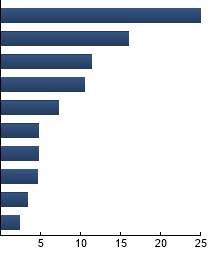|
|
 |
|
Investment Objective/Strategy - The First Trust S-Network E-Commerce ETF (the "Fund"), formerly the First Trust Nasdaq Retail ETF, seeks investment results that correspond generally to the price and yield (before the Fund's fees and expenses) of an equity index called the S-Network Global E-Commerce Index™ (the "Index"). The Fund will normally invest at least 90% of its net assets (plus any borrowings for investment purposes) in the common stocks and depository receipts that comprise the Index.
There can be no assurance that the Fund's investment objectives will be achieved.
- The Index begins with a universe of common stocks and depositary receipts of companies listed on a global securities exchange and issued by companies operating in the following business segments:
- Content Navigation
- Online Retail
- Online Marketplace
- E-Commerce Infrastructure
- To be eligible for the Index, a security must meet the following criteria:
- Minimum market capitalization of $100 million;
- Three-month average daily trading value of at least $5 million;
- Minimum free float of 20% of shares outstanding.
- All eligible securities from e-commerce companies are ranked based upon their market capitalization.
- The top 15 companies from each of the four business segments are selected and equally weighted.
- The Index is reconstituted and rebalanced quarterly.
| Ticker | ISHP |
| Fund Type | E-Commerce |
| Investment Advisor | First Trust Advisors L.P. |
| Investor Servicing Agent | Brown Brothers Harriman, Bank of New York Mellon Corp |
| CUSIP | 33738R829 |
| ISIN | US33738R8299 |
| Intraday NAV | ISHPIV |
| Fiscal Year-End | 03/31 |
| Exchange | Nasdaq |
| Inception | 9/20/2016 |
| Inception Price | $19.90 |
| Inception NAV | $19.90 |
| Rebalance Frequency | Quarterly |
| Total Expense Ratio* | 0.60% |
* As of 8/1/2024
| Closing NAV1 | $35.73 |
| Closing Market Price2 | $35.68 |
| Bid/Ask Midpoint | $35.68 |
| Bid/Ask Discount | 0.15% |
| 30-Day Median Bid/Ask Spread3 | 0.49% |
| Total Net Assets | $5,359,925 |
| Outstanding Shares | 150,002 |
| Daily Volume | 451 |
| Average 30-Day Daily Volume | 388 |
| Closing Market Price 52-Week High/Low | $38.29 / $27.17 |
| Closing NAV 52-Week High/Low | $38.19 / $27.33 |
| Number of Holdings (excluding cash) | 60 |
| Holding |
Percent |
| Reddit, Inc. (Class A) |
4.05% |
| lululemon athletica inc. |
2.36% |
| Williams-Sonoma, Inc. |
2.26% |
| Shopify Inc. (Class A) |
2.14% |
| Expedia Group, Inc. |
1.99% |
| DoorDash, Inc. (Class A) |
1.98% |
| Alphabet Inc. (Class A) |
1.97% |
| Amazon.com, Inc. |
1.96% |
| Zillow Group, Inc. (Class C) |
1.93% |
| Walmart Inc. |
1.90% |
* Excluding cash.
Holdings are subject to change.
Past performance is not indicative of future results.
| Maximum Market Cap. | $2,323,530 |
| Median Market Cap. | $29,619 |
| Minimum Market Cap. | $6,307 |
| Price/Earnings | 22.36 |
| Price/Book | 3.12 |
| Price/Cash Flow | 14.85 |
| Price/Sales | 1.94 |
| Country |
Percent |
| United States |
54.65% |
| China |
10.89% |
| Canada |
4.50% |
| United Kingdom |
4.48% |
| Germany |
4.26% |
| Australia |
3.19% |
| Japan |
3.07% |
| The Netherlands |
3.05% |
| South Korea |
1.79% |
| Denmark |
1.74% |
|
|
2024 |
Q1 2025 |
Q2 2025 |
Q3 2025 |
| Days Traded at Premium |
91 |
0 |
--- |
--- |
| Days Traded at Discount |
161 |
5 |
--- |
--- |
Tracking Index: S-Network Global E-Commerce Index™
|
Interactive Media & Services
|
24.97%
|
|
Broadline Retail
|
15.98%
|
|
Hotels, Restaurants & Leisure
|
11.43%
|
|
Financial Services
|
10.44%
|
|
Specialty Retail
|
7.26%
|
|
Real Estate Management & Development
|
4.77%
|
|
Consumer Staples Distribution & Retail
|
4.74%
|
|
Air Freight & Logistics
|
4.68%
|
|
Marine Transportation
|
3.35%
|
|
Textiles, Apparel & Luxury Goods
|
2.36%
|
|

|
MSCI ACWI Index - The Index is a free float-adjusted market capitalization-weighted index that is designed to measure the equity market performance of developed and emerging markets.
|
|
The information presented is not intended to constitute an investment recommendation for, or advice to, any specific person. By providing this information, First Trust is not undertaking to give advice in any fiduciary capacity within the meaning of ERISA, the Internal Revenue Code or any other regulatory framework. Financial professionals are responsible for evaluating investment risks independently and for exercising independent judgment in determining whether investments are appropriate for their clients.
|